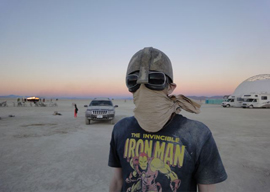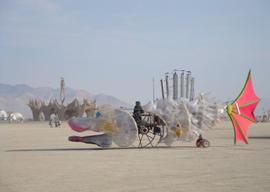
September 20, 2010

 A unique aspect of Burning Man is the absence of all forms of commerce “ you cannot buy or sell anything. You are expected to bring enough water to keep yourself alive, and ideally some food, but beyond that everything is gifted. It is an odd experience to wander around the desert at night, only to find yourself haled at by a stranger inviting you to take a seat at his makeshift bar and enjoy one of his cocktails. No one minds if you have come to Burning Man purely as an observer, although most people who return feel that they want to contribute something. During the day there are tents offering everything from healing sessions to couples classes in S&M.
A unique aspect of Burning Man is the absence of all forms of commerce “ you cannot buy or sell anything. You are expected to bring enough water to keep yourself alive, and ideally some food, but beyond that everything is gifted. It is an odd experience to wander around the desert at night, only to find yourself haled at by a stranger inviting you to take a seat at his makeshift bar and enjoy one of his cocktails. No one minds if you have come to Burning Man purely as an observer, although most people who return feel that they want to contribute something. During the day there are tents offering everything from healing sessions to couples classes in S&M.
Of course, there is also a fair amount of hokum. I was sharing an RV with my friend James who has just returned from four years in Afghanistan. He thinks he is suffering from PTSD and wanted to visit a healer. I accompanied him to a healing tent and left him to the ministrations of Ken, a grand master of the healing gaze. Ken made all the participants sit in two rows facing each other, then he instructed James to stare into his male partner’s eyes and to locate his femininity side in his partner’s masculinity. While staring at each other, Ken encouraged the participants to concentrate on giving their partner a gift, no matter what: “If you feel you wish to give the gift of Kali the Hindu Goddess of Destruction, then do so. As long as you give it as a gift, it is good.”
James became distracted by his partner’s dust-frosted white eyelashes. As a result, he failed to locate his feminine side in his partner’s eyes or to give a gift, of destruction or otherwise. At the end of five minutes of staring, James politely shook his partner’s hand. His partner remarked: “Total polarity, the t-shirt says it all.” Looking down at his t-shirt, James saw a picture of a superhero with the words “The Invincible Iron Man” emblazoned across it.
 However, irrespective of Ken and his ilk, Burning Man does raise some serious issues. It is interesting how, when given a high degree of responsibility, people behave responsibly. The absence of regulations and the extreme environment create the potential for many kinds of hazards. And yet, over the week that I was there, I saw nothing untoward. This confirms my belief in a more general principle: the way we treat people determines the way that they behave. Similarly, if we keep telling children that they are irresponsible, or we keep telling people that they are mentally ill, then we effectively prevent them from changing and improving. Of course it’s not black and white, but currently I do not think we have the right balance.
However, irrespective of Ken and his ilk, Burning Man does raise some serious issues. It is interesting how, when given a high degree of responsibility, people behave responsibly. The absence of regulations and the extreme environment create the potential for many kinds of hazards. And yet, over the week that I was there, I saw nothing untoward. This confirms my belief in a more general principle: the way we treat people determines the way that they behave. Similarly, if we keep telling children that they are irresponsible, or we keep telling people that they are mentally ill, then we effectively prevent them from changing and improving. Of course it’s not black and white, but currently I do not think we have the right balance.
Secondly, it is interesting how the absence of money, the fact that cell phones don”t work, and participation in a shared enterprise, makes people engage with one another in ways that we have all but forgotten. Standing in a queue at midday, strangers freely talk to each other and neither is afraid that the other is about to ask for money. This unusual human dynamic may be the reason why people return time and again. Perhaps it provides modern urban individualists with a sense of community, be it ever so ephemeral.
Finally, it is initially quite disconcerting constantly to be given things for free. It takes some time to still the inner voice which asks, “But what do they want from me?” However, after a while you overcome the feeling of indebtedness and you realize that you do have something to give, namely the grace of receiving joyfully. After all, that is what makes giving pleasurable.
What would happen if Burning Man lasted for more than a week? How would it cope if there were competition for resources? I don”t know. However, it is a fascinating experience which I would recommend to everyone.